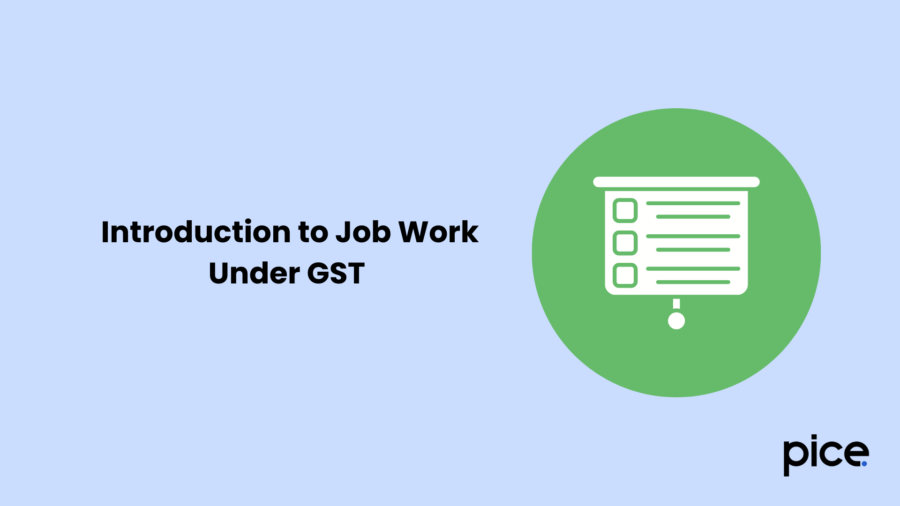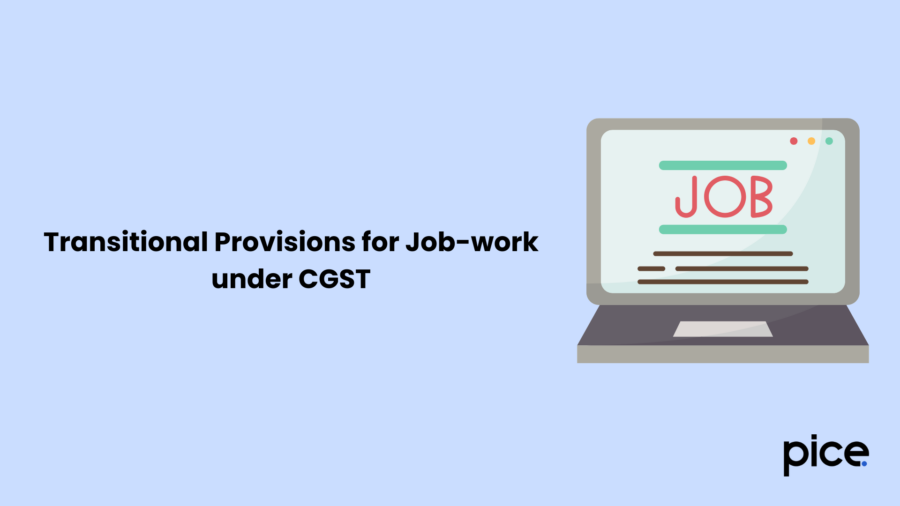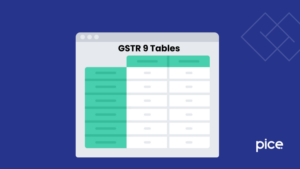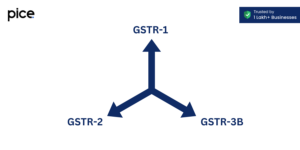A Guide on impact of GST on Job Work and Electronic Commerce
- 23 Jun 25
- 12 mins

A Guide on impact of GST on Job Work and Electronic Commerce
- Introduction to Job Work Under GST
- What are the Responsibilities that lie with the Principal?
- Time Constraint for Returning the Processed Goods to the Owner
- GST Rates for Job Work
- Credit for Input Taxes Paid on Goods Supplied to Job-worker
- Procedure to Claim Input Tax Credit on Job Work
- Transitional Provisions for Job-work under CGST
- Conclusion
Key Takeaways
- Job work under GST allows principals to send goods for processing without paying tax upfront, enabling operational flexibility.
- Principals must ensure goods are returned within 1 year (inputs) or 3 years (capital goods) to avoid GST liability and interest.
- Input Tax Credit (ITC) is claimable on goods sent for job work, even when shipped directly from supplier to job worker.
- Job workers charge GST on services provided, and rates vary from 0% to 12% depending on the type of job work.
- Timely filing of Form ITC-04 and adherence to documentation rules are crucial for compliance and smooth tax credits.
The concept of job work plays a pivotal role in India’s manufacturing and processing industry. Job work under GST has been recognised and formalised to ensure smoother tax compliance and clarity for all stakeholders involved. Job work refers to the processing or working on goods supplied by a principal manufacturer to a job worker.
Whether it’s assembly, packing, polishing, or any form of processing, job work operations are a crucial part of the supply chain, especially for MSMEs and contract manufacturers. The GST law outlines specific provisions to regulate job work, including registration requirements, documentation, tax liability, and input tax credit.
This article provides an overview of job work, impact of GST on job work, time constraints, applicable rate of GST and more for businesses.
Introduction to Job Work Under GST

CGST Act 2017 provides a formal concept of job work under GST in Section 2(68). This section defines it as ‘any treatment or process undertaken by a person on goods belonging to another registered person’. A ‘job worker’ does the said job, and the ‘principal’ is the person doing the job.
For instance, an electronics company sends semi-finished goods such as circuit boards to a job worker for soldering and assembly. This arrangement allows the principal to focus on core production while the job worker handles specific tasks. With GST in place, such transactions are better regulated, and the impact of GST on job work and electronic commerce has been positive.
Job workers are generally small people or businesses that are unable to comply with or keep up with distinct terms of law. Considering them, the government made the principal manufacturers responsible for conforming to the rules.
What are the Responsibilities that lie with the Principal?
To properly understand the impact of GST on job work, read the responsibilities that lies with the principal, from below:
- Firstly, the Principal must send the inputs or capital goods to the job worker under the cover of a delivery challan, not a tax invoice, detailing the goods precisely. Crucially, the Principal can claim Input Tax Credit (ITC) on these goods, even if they are sent directly to the job worker's premises from the supplier.
- The Principal is responsible for ensuring the goods are returned within the stipulated time limits: 1 year for inputs and 3 years for capital goods. Failure to receive the goods back within this timeframe results in the transaction being treated as a 'deemed supply' from the date the goods were initially sent. Consequently, the Principal becomes liable to pay GST plus interest on these goods.
- Furthermore, the Principal is ultimately liable for the GST payable on the final processed goods. While the job worker charges GST on their service fees (which the Principal can usually claim as ITC), the responsibility for the final product's tax rests with the Principal. They must also maintain proper records of goods sent, received back, or supplied directly from the job worker's premises (often using Form GST ITC-04, though requirements may evolve).
Time Constraint for Returning the Processed Goods to the Owner
The goods given by the principal are supplied to the job workers by default. However, if the job worker returns these goods to the principal manufacturer within an allotted time frame, this act is out of GST. These timeframes for returning processed goods to the owner are as follows:
- Input Goods: If goods supplied to the registered job worker are not returned within 1 year after completion of job work, they are considered provided goods.
- Capital Goods: The time limit for these goods is 3 years.
Time Limit Extension for Returning Processed Goods to Principal

The impact of GST on job work includes provisions for extending the time limit for returning goods in certain scenarios. The amendment, as of 1 February 2019, allows this.
Allowed extensions for different goods are as follows:
● 1 year for input goods.
● 2 years for capital goods.
Steps for Time Limit Extension
Extension of the time limit provides the principal manufacturer's business with flexibility and smooth operation. This elevates the positive impact of GST on job work.
If a principal needs a time limit extension for both their capital and input goods, they need to follow these steps:
Step 1: Contact the state tax or central tax commissioner, who is authorised to grant an extension.
Step 2: Raise a request for an extension with a valid reason backing your request.
Step 3: Submit a written application that states the duration of the requested extension and the need for the same.
Step 4: Provide all supporting documents and justification with a written application.
Consequences for Not Abiding by the Threshold Limit of Time
The impact of GST on job work service includes inevitable consequences if the time constraint is not followed:
● GST Liability: If goods are not returned within the time limit, the principal is deemed to have supplied them to the job worker, and it becomes a 'taxable supply'.
● GST Disclosures: To maintain GST compliance, the principal must report the deemed outward supply and tax liability in their GSTR-3B and GSTR-1 returns.
● Interest Charges: The principal must also pay 18% interest per annum on the tax amount from the day those goods were sent for job work.
GST Rates for Job Work
The GST rates it also determine the impact of GST on job work.
Registered workers under job work have to pay a 12% GST rate, and an unregistered person has to pay an 18% GST. Given below is a table that specifies the tax rate on specific job works:
| Job Work | GST Rates for Job Work |
| Forestry, agriculture, animal husbandry, and fishing | 0% |
| Mediator services associated with animal rearing and cultivation | 0% |
| Diamond supply | 1.5% |
| Newspaper Printing, Textile and textile products, Jewellery, book printing (including Braille books), periodicals and journals, hides processing, and leather and skins | 5% |
| Engineering | 12% |
Credit for Input Taxes Paid on Goods Supplied to Job-worker

Under India's GST law, a significant benefit for the Principal is the ability to claim Input Tax Credit (ITC) on goods sent to a job worker for processing. This means that the Principal can claim credit of tax paid for the GST paid on the raw materials or capital goods even before the final product is sold.
Importantly, this ITC can be claimed even if the goods are directly sent from the supplier's premises to the job worker's location, bypassing the Principal's own factory. This provision facilitates smoother operations and reduces the tax burden on the Principal, promoting efficiency in job work arrangements.
Procedure to Claim Input Tax Credit on Job Work
A principal manufacturer can claim input tax credit (ITC) by filling out ITC 4 form. ITC 4 form has information regarding all goods sent to the job worker by the principal. It was necessary to fill this form the quarterly before 1st October 2021.
Since then, semi-annual and annual are the changed frequencies for filing ITC-04 form. Annual turnover of Rs. 5 crore requires semi-yearly filing, and an annual turnover up to Rs. 5 crore requires yearly filing.
Steps for Filing ITC-04 Form on GST Portal
With the help of online GST portal, ITC-04 can be filed by the worker for job work, by following the steps discussed below:
Step 1: Log in to the GST portal using your valid credentials to access your dashboard.
Step 2: Click ‘Services’, then go to ‘Returns’ and select ‘ITC Forms’ to begin the process.
Step 3: Go to the ‘Prepare Offline’ section and upload your job work process-related invoices as required.
Step 4: Once the invoices are uploaded, click on ‘Initiate Filing’ to proceed with the return process.
Step 5: Choose the relevant tax period for filing the return.
Step 6: Review all details, including taxable value and input tax credit information, to ensure accurate record information.
Step 7: Submit the return using a Digital Signature Certificate (DSC) or Electronic Verification Code (EVC) for final authentication.
Following this process correctly ensures accurate ITC claims, which is crucial for understanding the impact of GST on job work. It helps particularly in maintaining tax efficiency and smooth compliance.
Rules and Restrictions to Claim Input Tax Credit under Job Work
Impact of GST on job work is driven by the set rules that condition the claiming of ITC on job work. These rules are as follows:
| Aspects | Specifications |
| Type of goods | Input, capital, or semi-finished goods |
| Shipment type | Direct shipment from supplier or shipment from primary location of business |
| Required challan details | Basic details such as date and number of delivery challan; recipient’s and sender’s name, address, and GSTIN; quantity for HSN, product description, and code; SGST, CGST, UTGST, and IGST; and signature and place of supply |
| Filling required forms | GSTR-1 form with challan details and ITC 04 |
| Time limit | 3 years for capital goods and 1 year for input goods |
Transitional Provisions for Job-work under CGST

Transitional provisions under GST for job work apply to goods that were sent to the job worker before the implementation of GST and returned after it came into effect. These provisions reflect the positive impact of GST on job work, offering more flexibility in credit claims and smoother compliance.
Points below give an overview of transitional provisions:
● If the job worker returns these goods to the principal’s factory within six months from 1st July, no GST will be charged.
● A principal manufacturer can extend this period by two more months.
● To avoid any tax liability, the principal must declare the goods the job worker holds in Form TRAN-1.
● If the principal wants to sell the goods presented to the job worker, they must pay all and any applicable taxes. These include Excise and VAT if sold before GST implementation or GST if sold after.
● An exception exists for goods exported within six months from the GST rollout date.
● If any job worker does not return the goods within an allowed time period, the government will recover ITC from the principal manufacturer.
● Principal can claim ITC on goods sent for job work, even if they never brought them to their own premises.
GST law has a whole chapter on transitional provisions. One key advantage of the impact of GST on job work is the simplification of handling pre- and post-GST transactions by the principal.
Conclusion
Broadly speaking, the impact of GST on job work has changed the paradigm of job work and laid a foundation for the Indian manufacturing and services ecosystem. GST promises to open a more simplified and transparent process to govern the job work, doing all the above provisions intended to enable smooth operations, tax neutrality, and better compliance.
However, due diligence of maintaining proper documentation, following strict timelines, and knowing the technicalities of the sphere of registration, ITC, valuation, and e-way bill requirements becomes essential for businesses.
Both principals and job workers will be able to derive maximum benefit under the new provisions of GST and operate more capital-efficient, tax-compliant operations through compliance with the overall rules and avoidance of certain common pitfalls.
💡If you want to streamline your invoices and make payments via credit or debit card or UPI, consider using the PICE App. Explore the PICE App today and take your business to new heights.
FAQs
What is considered ‘job work’ under GST?
Can a principal claim Input Tax Credit (ITC) on goods sent to a job worker?
What happens if goods are not returned within the prescribed time limit?
What are the GST rates applicable to job work services?
0% for agriculture and allied services
1.5% for diamond processing
5% for textiles, leather, and printing
12% for engineering services
Unregistered job workers attract 18% GST. The rate applies to the service charges and is usually paid by the job worker.



















